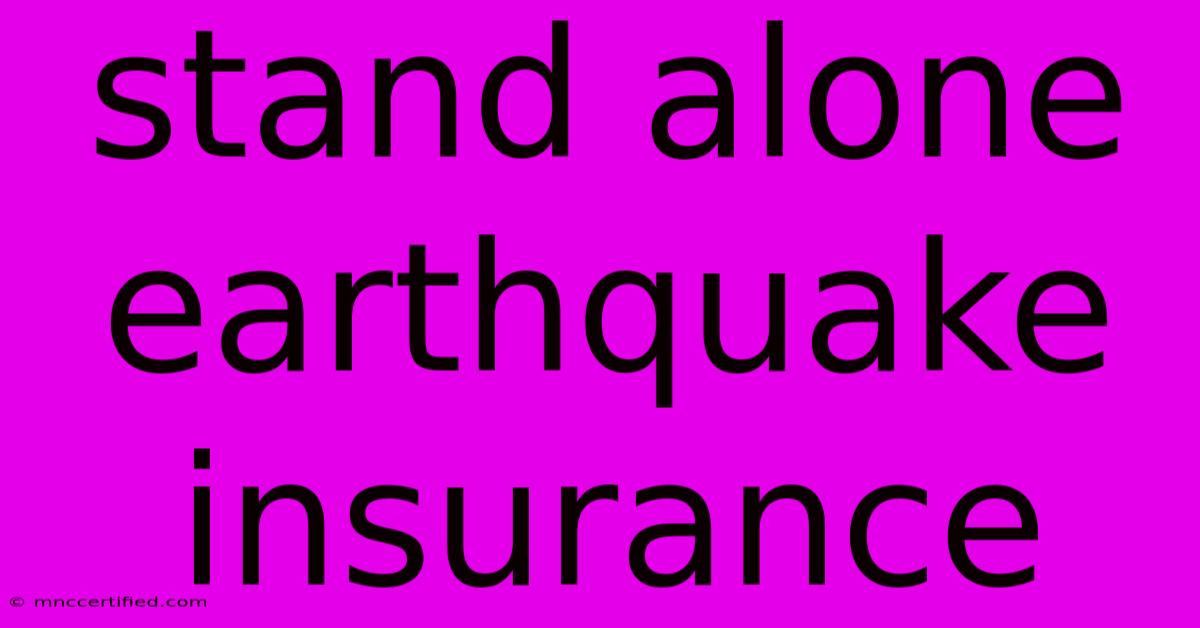Stand Alone Earthquake Insurance

Table of Contents
Standalone Earthquake Insurance: Protecting Your Home from Seismic Events
Earthquakes are unpredictable and devastating. While standard homeowners insurance policies typically exclude earthquake damage, a standalone earthquake insurance policy is crucial for protecting your most valuable asset: your home. This comprehensive guide explores everything you need to know about standalone earthquake insurance, helping you make an informed decision about protecting your property.
What is Standalone Earthquake Insurance?
Standalone earthquake insurance is a separate policy that covers damage to your home and belongings caused by earthquakes. Unlike comprehensive homeowner's insurance, which often excludes earthquake coverage entirely, a standalone policy specifically addresses seismic events. This means it covers damage like:
- Foundation cracks: A common and often costly consequence of earthquakes.
- Structural damage: Repairing walls, roofs, and other structural elements.
- Contents damage: Replacing or repairing furniture, appliances, and personal belongings damaged in the quake.
- Landslides and mudslides: If triggered by an earthquake, these can also be covered.
Key Difference: It's crucial to understand that earthquake insurance is not included in standard homeowners insurance. You must purchase it separately.
Why You Need Standalone Earthquake Insurance
The financial consequences of earthquake damage can be catastrophic. Repair costs can easily reach hundreds of thousands of dollars, leaving homeowners financially devastated. Standalone earthquake insurance provides a financial safety net, allowing you to rebuild or repair your home and replace your belongings after a quake.
Here are some key reasons to consider this vital coverage:
- High repair costs: Earthquakes can cause extensive and costly damage.
- Limited government assistance: Government aid may not be sufficient to cover all repair costs.
- Peace of mind: Knowing you're protected gives invaluable peace of mind in earthquake-prone regions.
- Mortgage requirements: Some lenders may require earthquake insurance in high-risk areas.
Understanding Earthquake Insurance Policies
Earthquake insurance policies vary significantly. It's essential to compare policies from different insurers to find the best coverage for your needs and budget. Here are some key factors to consider:
Deductibles:
Earthquake insurance policies often have high deductibles, sometimes as high as 10-20% of your home's value. This is because earthquake events can cause widespread damage, leading to numerous claims. Understanding your deductible is critical before purchasing a policy.
Coverage Limits:
Policies have limits on the amount they'll pay out for damage. Ensure the coverage limit is sufficient to rebuild or repair your home and replace your belongings. Consider the rebuilding costs in your area and adjust accordingly.
Replacement Cost vs. Actual Cash Value:
Some policies cover the cost of replacing your home and belongings with new items (replacement cost), while others pay out based on the depreciated value (actual cash value). Replacement cost coverage is generally preferred.
Ordinance or Law Coverage:
This covers costs associated with upgrading your home to meet current building codes during repairs, which can be significant.
How to Find the Right Standalone Earthquake Insurance
Shopping for earthquake insurance requires careful research. Here's how to find the best policy:
- Assess your risk: Determine your location's earthquake risk using online tools and resources from geological surveys.
- Compare quotes: Get quotes from multiple insurers to compare prices and coverage options.
- Review policy details: Carefully read the policy documents to understand coverage limits, deductibles, and exclusions.
- Consider your needs: Choose a policy that provides adequate coverage for your home and belongings.
- Consult with an insurance professional: An independent insurance agent can help you navigate the options and find the best fit.
Off-Page SEO Considerations:
To boost the ranking of this article, consider these off-page SEO strategies:
- Link building: Reach out to relevant websites (insurance blogs, real estate sites) and request backlinks to this article.
- Social media promotion: Share the article on relevant social media platforms to increase visibility.
- Guest posting: Write guest posts on other websites in the insurance or real estate niche, including a link back to this article.
- Local SEO: If targeting a specific region, optimize for local keywords and list the article on relevant local directories.
By understanding the nuances of standalone earthquake insurance and employing effective SEO strategies, you can create a valuable resource that helps homeowners protect their most important asset. Remember, proactive planning and comprehensive insurance are key to mitigating the financial risks associated with earthquakes.

Thank you for visiting our website wich cover about Stand Alone Earthquake Insurance. We hope the information provided has been useful to you. Feel free to contact us if you have any questions or need further assistance. See you next time and dont miss to bookmark.
Featured Posts
-
Michigan Lands 5 Star Qb Underwood
Nov 22, 2024
-
Reverend Richard Coles Age Husband Music
Nov 22, 2024
-
Arsenal Edges Juventus 1 0 Ucl Recap
Nov 22, 2024
-
Iceland Eruption 2024 Travel Impacts
Nov 22, 2024
-
Legal Forex Trading App In India
Nov 22, 2024